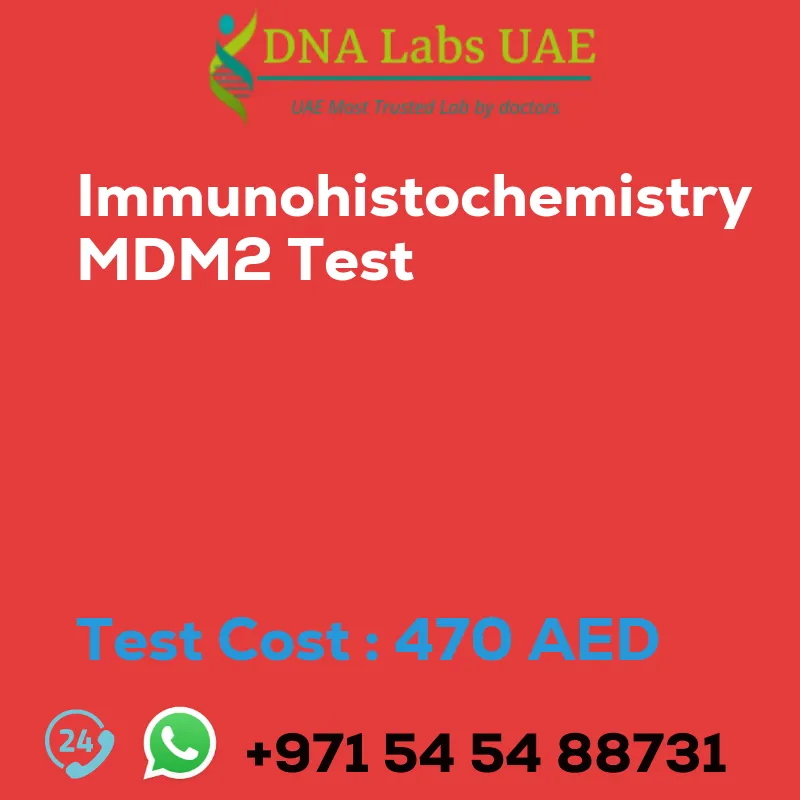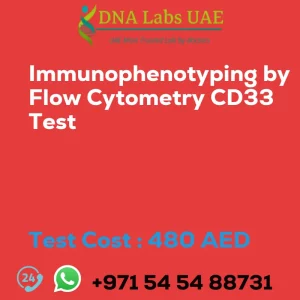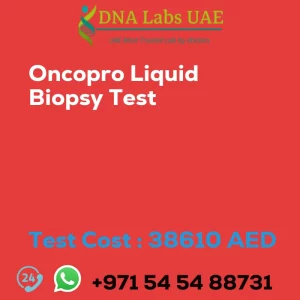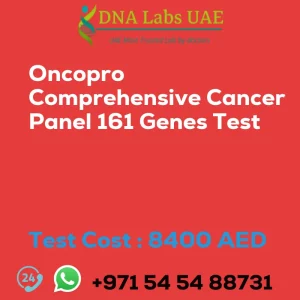IMMUNOHISTOCHEMISTRY MDM2 Test
Test Name: IMMUNOHISTOCHEMISTRY MDM2 Test
Components: Immunohistochemistry
Price: 470.0 AED
Sample Condition: Submit tumor tissue in 10% Formal-saline OR Formalin fixed paraffin embedded block. Ship at room temperature. Provide a copy of the Histopathology report, Site of biopsy and Clinical history.
Report Delivery: Sample Daily by 6 pm; Report Block: 5 days, Tissue Biopsy: 5 days, Tissue large complex: 7 days
Test Type: Cancer
Doctor: Oncologist, Pathologist
Test Department: HISTOLOGY
Pre Test Information: Provide a copy of the Histopathology report, Site of biopsy and Clinical history.
Test Details:
The MDM2 immunohistochemistry (IHC) test is used to detect the expression of MDM2 protein in tissue samples. MDM2 is an oncogene that plays a critical role in regulating the tumor suppressor protein p53. It acts as a negative regulator of p53, promoting its degradation and inhibiting its transcriptional activity.
The MDM2 IHC test involves the use of specific antibodies that bind to the MDM2 protein in tissue sections. This allows for the visualization and quantification of MDM2 expression within the cells. The test is commonly performed on formalin-fixed, paraffin-embedded tissue samples obtained from biopsies or surgical resections.
The MDM2 IHC test is primarily used in the diagnosis and prognosis of various cancers, including soft tissue sarcomas, liposarcomas, and certain types of lymphomas. Elevated levels of MDM2 expression have been associated with tumor progression, poor prognosis, and resistance to chemotherapy in some cancer types.
Interpretation of the MDM2 IHC test results is typically done by a pathologist who evaluates the staining intensity and distribution within the tissue. The results are reported as positive or negative, indicating the presence or absence of MDM2 protein expression, respectively. In some cases, the staining pattern may also provide additional information about the molecular subtype of the tumor.
It is important to note that the MDM2 IHC test is just one tool in the diagnostic and prognostic evaluation of cancer patients. It is often used in conjunction with other tests, such as molecular genetic analyses, to provide a comprehensive assessment of the disease.
| Test Name | IMMUNOHISTOCHEMISTRY MDM2 Test |
|---|---|
| Components | |
| Price | 470.0 AED |
| Sample Condition | Submit tumor tissue in 10% Formal-saline OR Formalin fixed paraffin embedded block. Ship at room temperature. Provide a copy of the Histopathology report, Site of biopsy and Clinical history. |
| Report Delivery | Sample Daily by 6 pm; Report Block: 5 days Tissue Biopsy: 5 days Tissue large complex : 7 days |
| Method | Immunohistochemistry |
| Test type | Cancer |
| Doctor | Oncologist, Pathologist |
| Test Department: | HISTOLOGY |
| Pre Test Information | Provide a copy of the Histopathology report, Site of biopsy and Clinical history. |
| Test Details |
The MDM2 immunohistochemistry (IHC) test is used to detect the expression of MDM2 protein in tissue samples. MDM2 is an oncogene that plays a critical role in regulating the tumor suppressor protein p53. It acts as a negative regulator of p53, promoting its degradation and inhibiting its transcriptional activity. The MDM2 IHC test involves the use of specific antibodies that bind to the MDM2 protein in tissue sections. This allows for the visualization and quantification of MDM2 expression within the cells. The test is commonly performed on formalin-fixed, paraffin-embedded tissue samples obtained from biopsies or surgical resections. The MDM2 IHC test is primarily used in the diagnosis and prognosis of various cancers, including soft tissue sarcomas, liposarcomas, and certain types of lymphomas. Elevated levels of MDM2 expression have been associated with tumor progression, poor prognosis, and resistance to chemotherapy in some cancer types. Interpretation of the MDM2 IHC test results is typically done by a pathologist who evaluates the staining intensity and distribution within the tissue. The results are reported as positive or negative, indicating the presence or absence of MDM2 protein expression, respectively. In some cases, the staining pattern may also provide additional information about the molecular subtype of the tumor. It is important to note that the MDM2 IHC test is just one tool in the diagnostic and prognostic evaluation of cancer patients. It is often used in conjunction with other tests, such as molecular genetic analyses, to provide a comprehensive assessment of the disease. |







